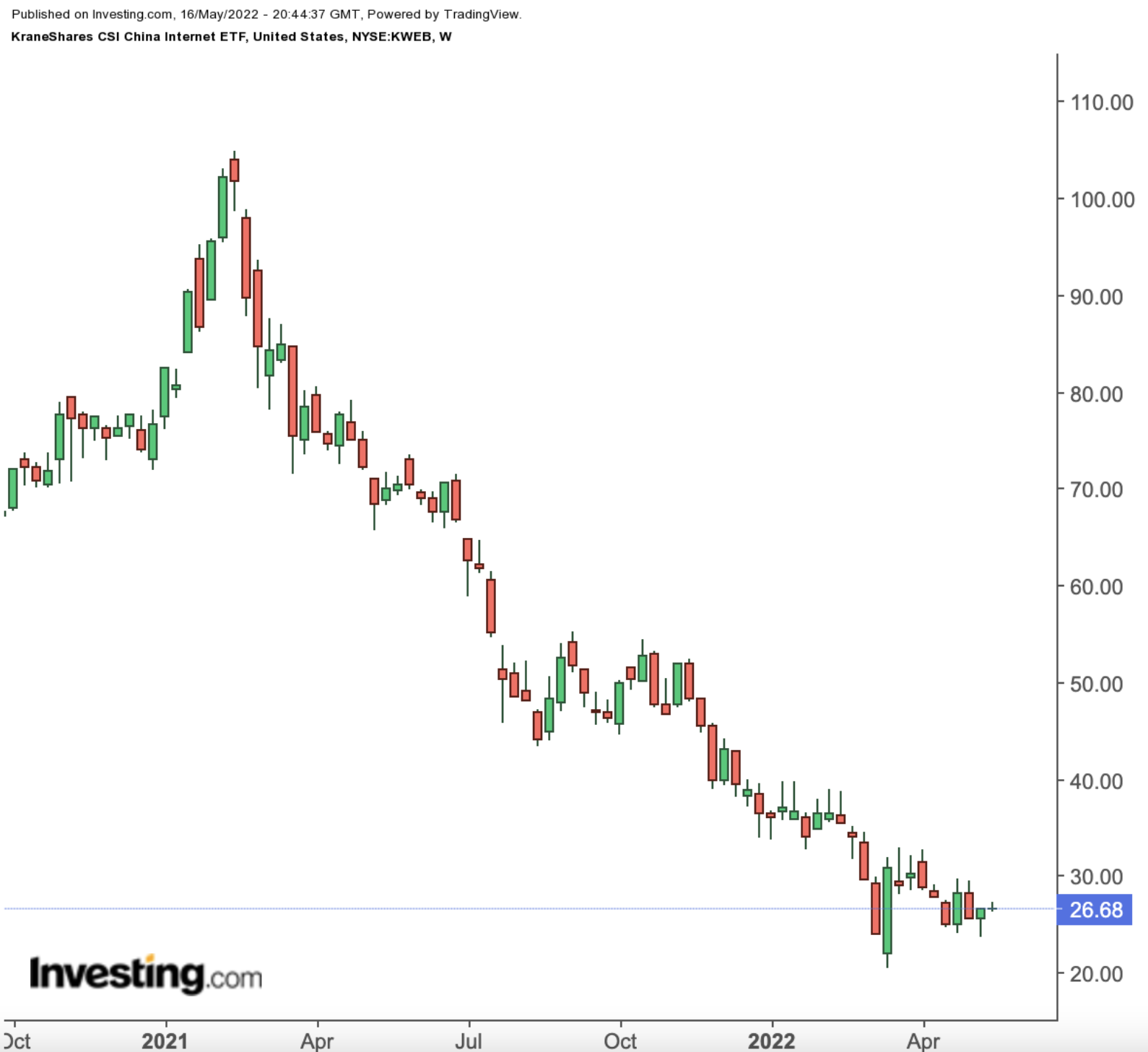China is the world’s most populous nation with a vastly expanding urban middle class. It is also the world’s second largest economy, after the US. Therefore, growth investors keep a close eye on many Chinese shares.
Due to state interference, equity markets in China have been facing severe hiccups over the past year. Meanwhile, as part of the “Holding Foreign Companies Accountable Act (HFCAA),” many Chinese companies face delisting in the US.
In addition, supply chain disruptions due to the ongoing COVID-19 shutdowns and the likelihood of an economic slowdown have added to investors’ worries. For instance, recent metrics show that retail sales declined over 11% year-on-year. In early May, Fitch Ratings also cut the expected GDP growth for the year.
As a result, Chinese stocks have come under extended pressure. Since January, the two benchmark indices, the Shenzhen CSI 300 and the Shanghai Composite Index, have lost 19.9% and 15.5%. By comparison, the S&P 500 and the Dow Jones Industrial Average have declined 15.9% and 11.3% so far this year.
Many analysts remain bullish on Chinese tech stocks despite these headwinds, thanks to solid cash flows and enticing double-digit growth prospects. Meanwhile, Chinese President Xi Jinping announced a leadership pledge to:
“support the healthy development of tech platform companies.”
Examples of China ETFs
There are currently dozens of exchange-traded funds (ETFs) that give broad access to Chinese equities:
- Franklin FTSE China ETF (NYSE:FLCH) - 22.1% year-to-date (YTD);
- Global X China Biotech Innovation ETF (NASDAQ:CHB) - 32.0%;
- Global X MSCI China Consumer Disc ETF (NYSE:CHIQ) - 28.0%;
- iShares MSCI China ETF (NASDAQ:MCHI) - 22.7%;
- Invesco Golden Dragon China ETF (NASDAQ:PGJ) - 29.3%;
- Rayliant Quantamental China Equity ETF (NYSE:RAYC) - 24.7%;
- SPDR S&P China ETF (NYSE:GXC) - 22.0%;
As these metrics show, 2022 has been a tough year for long-term China bulls. Today’s article focuses on Chinese internet shares and an ETF that invests in them.
Chinese Internet Stocks
With over 1 billion internet users, China is the world’s largest internet market. Thus, it’s no surprise to see investors’ interest in Chinese online stocks, especially e-commerce ones.
InvestingPro website provides access to Chinese internet stocks that can appeal to long-term investors. For instance, among the large-capitalization (cap) ones are the e-commerce icons Alibaba (NYSE:BABA) and JD.com (NASDAQ:JD); online gaming giant NetEase (NASDAQ:NTES); internet search as well as AI behemoth Baidu (NASDAQ:BIDU); social media platform Weibo (NASDAQ:WB); online discount retailer Vipshop (NYSE:VIPS); and Autohome (NYSE:ATHM).
Meanwhile, the fastest-growing Chinese internet stocks include the social platform JOYY (NASDAQ:YY); Weibo; Alibaba Group Holding; JD.com; and NetEase.
Those investors looking for undervalued Chinese internet stocks may want to research Weibo; Autohome; Baidu; Vipshop; Alibaba; and travel group Tuniu (NASDAQ:TOUR).
Several stocks currently trade at relatively low price-to-book (P/B) ratios. Examples include Tuniu; media and gaming company Sohu.com (NASDAQ:SOHU); JOYY; online entertainment name Hello Group (NASDAQ:MOMO); and e-commerce services provider Baozun (NASDAQ:BZUN).
Finally, investors who pay attention to analyst price targets may be interested to know that several Chinese internet stocks could see significant upsides from current price levels. Alibaba, Baidu, Sohu.com, Weibo, JOYY, and JD.com are among those shares.
Understandably, picking stocks that best serve individual portfolio objectives requires serious due diligence. Thus, retail investors could find it more convenient to invest in an ETF that provides thematic access to the emerging Chinese internet industry.
KraneShares CSI China Internet ETF
- Current Price: $26.68
- 52-week range: $20.41 - $73.54
- Expense ratio: 0.70% per year
The KraneShares CSI China Internet ETF (NYSE:KWEB) invests in Chinese internet companies listed overseas, mainly in the US as well as Hong Kong (HK). It tracks the CSI Overseas China Internet Index.

KWEB, which was launched in July 2013, currently holds 47 stocks. In terms of sectoral allocations, we see consumer discretionary (43.7%), communication services (41.8%), and industrials (4.1%), among others.
In 2022, the ETF changed the weightings for listing locations to mitigate the potential impact of the HFCAA legislation and delisting in the US. Now, more than two-thirds of the shares are listed in Hong Kong (HK). Next come US-listed Chinese companies (26.2%). And finally, over 5% of the names are likely to have a Hong Kong listing soon.
The top 10 holdings make up almost two-thirds of $5.4 billion in net assets. Among those are Tencent (OTC:TCEHY), which owns a range of businesses in gaming, social media and fintech; Alibaba; JD.com; Baidu; and on-demand delivery name Meituan (OTC:MPNGY).
KWEB saw a record high on June 1, 2021. But what a difference a year has made. Since January, the fund has shed 26.8% and 61% over the past 12 months. It hit a 52-week low on Mar. 15.
Long-term investors looking to generate returns from the rising domestic consumption habits of China’s growing middle class should consider researching the fund further. Most potentially harmful news is likely to have been priced in the KWEB ETF.
